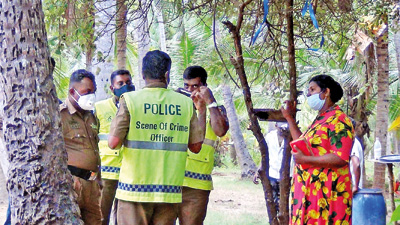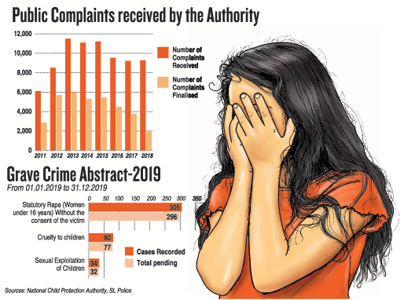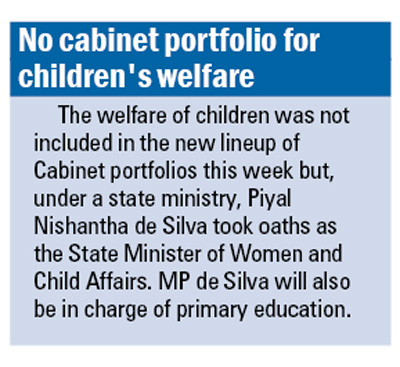News
NCPA slammed for gross failure to act in children’s defence
The child protection’s body’s 20-year delay in implementing a National Child Policy, failure to compile a national database and lax recruitment of adequate and qualified staff has let down the country’s children, exposing them to great harm, a scathing report has found.

Scene of the crime: 10-year-old victim Senuri from the rural area of Sirambiadiya in Puttalam, was molested and later killed by her mother’s partner
“Even though child abuses, delinquencies and injuries had been on the rise during the previous seven years, the higher management of the [National Child Protection Authority – NCPA] had not properly directed the district/divisional child protection/district psychosocial officers for preventing such occurrences,” the Auditor-General states.
The special report, “Role of the National Child Protection Authority relating to Child Abuse in Sri Lanka”, was released last month.
Reports of the gruesome deaths of underage children have emerged in recent weeks. The victims, male and female, died as a result of sexual abuse or domestic cruelty, with the youngest being eight months of age.
One victim,10-year-old Senuri from the rural area of Sirambiadiya in Puttalam, was molested and later killed by her mother’s current partner. Senuri had never attended school despite being 10 years of age, and was among eight children her mother had with two previous husbands.
“This is a clear indication that state officers varying from the grama sevaka, midwives, police, education and samurdhi officers and child protection officers have failed to address grave issues in their respective areas such as school dropouts, lack of sex education, teenage pregnancies, parents’ ignorance and negligence, protection of children in mother migrated families, economic hardship,” Professor Harendra de Silva, emeritus professor of paediatrics, child rights activist and founder chairman of the NCPA said.
Prof. de Silva said every government should have child welfare as priority.
“Child abuse and cruelty comes under the penal code; it cannot be sorted out at police stations or by village committees. One cannot advise the molester even if the person is a family member,” he said.
He pointed out that such abuses are regarded as “grave offences” by the law.
“We don’t need new laws,” Prof. de Silva emphasised. “There are enough legal provisions. we need is swift action against molesters and abusers. Lack of accountability is one of the major concerns. Justice delayed is justice denied.”
In the nine years to 2019 when the Auditor-General’s report commenced, 48,361 complaints came before the police division of the NCPA. Of that, only 413 were investigated and referred to the Attorney-General to take to the High Court. Of the 413, only 185 cases were actually filed at the High Court.
“Court hearings should be accelerated; some defence postponements cause the cases to drag for weeks and months. Child abuse cases should be concluded as soon as possible but, sadly, in some teenage rape cases the judgment [only comes after] the victim is married and trying to recover from the hurting past,” Prof. de Silva said.
Last year, according to police statistics, 305 cases of statutory rape of females under the age of 16 were reported, and by the end of the year 296 were still pending. Also in 2019, 80 cases of cruelty to children and 34 cases of sexual exploitation were reported but by the end of the year 77 and 32 cases respectively remained as pending investigations. 
Prof. de Silva said it was important to strengthen rehabilitation processes with counselling and psychosocial support. The health ministry needed to focus on the country’s need for child psychiatrists and child psychologists as there were just a handful of experts, and provide all necessary assistance and encouragement to strengthen its cadre.
Dr. Miyuru Chandradasa, consultant child and adolescent psychiatrist attached to the Ragama Teaching Hospital, told the Sunday Times that depression, anxiety and post-traumatic stress disorder (PTSD) occur in victims of abuse, especially when court cases drag on for many years.
“Some victims have not revealed their past sexual abuse encounter to their spouses, but then after a decade or so, they are called to court. This causes immense mental health issues. Unfortunately, the health sector in the country has not given prominence to mental health. The police are concerned with the physical evidence of abuse and not the psychological evidence,” Dr. Chandradasa said.
The Auditor-General recommended that it be compulsory for principals to set up School Protection Committees.
The report noted that civil society committees had been a white elephant for years. Despite a high amount of expenditure, there had been few beneficiaries.
“The expenditure incurred only for the “Jana Pavura” for the period of 2018 to 30 October 2019 was Rs. 17 million, and programmes had been conducted only in two districts,” the report pointed out.
“There is a dearth of trained officers for holding interviews in relevant police stations and only two posts had been created for the video evidence preparation units that commenced in the year 2001,” the report added.
NCPA Chairman Prof. Muditha Vidanapathirana said a National Child Policy, which he said had been formulated, would be implemented by November and that, at present, discussions were being held with the defence, justice, labour and education ministries on the implementation process.
“The 400 child development centres will be increased to 50,000 and continuous monitoring will take place,” he said.
Prof. Vidanapathirana said the recording of evidence via video would become available in all provinces as a Cabinet paper had been submitted to bring this about.
All 14,022 grama sevaka divisions would be instructed to ensure mandatory schooling for all children and the establishment of school child protection committees.
Prof. Vidanapathirana also said an Additional Solicitor-General was helping with child abuse-related cases in the Attorney-General’s Department.
Pic and additional reporting by our Puttalam correspondent, Hiran Priyankara Jayasinghe
| Empty seats at NCPA | |
| The Auditor-General’s report highlighted the fact that a number of vacancies have not been filled for many years at the National Child Protection Agency (NCPA).“Even though the Director/Assistant Director of the Law Enforcement Division should read and select the complaints received by the Authority and refer to the other divisions, the post of Director (Law Enforcement) has remained vacant for seven years,” the report said.The post of Director (Legal), Second Stage of the Complaint-Resolving Process has remained vacant for a period of six years from the year 2014 and the job of Clinical Psychologist has been unfilled since July 13, 2018.A total of 131 posts of district child protection/psychosocial and divisional child protection officers remain vacant. The vacancies were a prime cause of the load of unresolved cases, the Auditor-General’s report said. It also drew attention to a high number of resignations from the NCPA. Last year, 41 field officers quit their posts. NCPA Chairman Prof. Muditha Vidanapathirana said the resignations were mainly due to low salaries, no transfers or promotion for many years and a lack of permanent positions for officers with experience and qualifications. |


